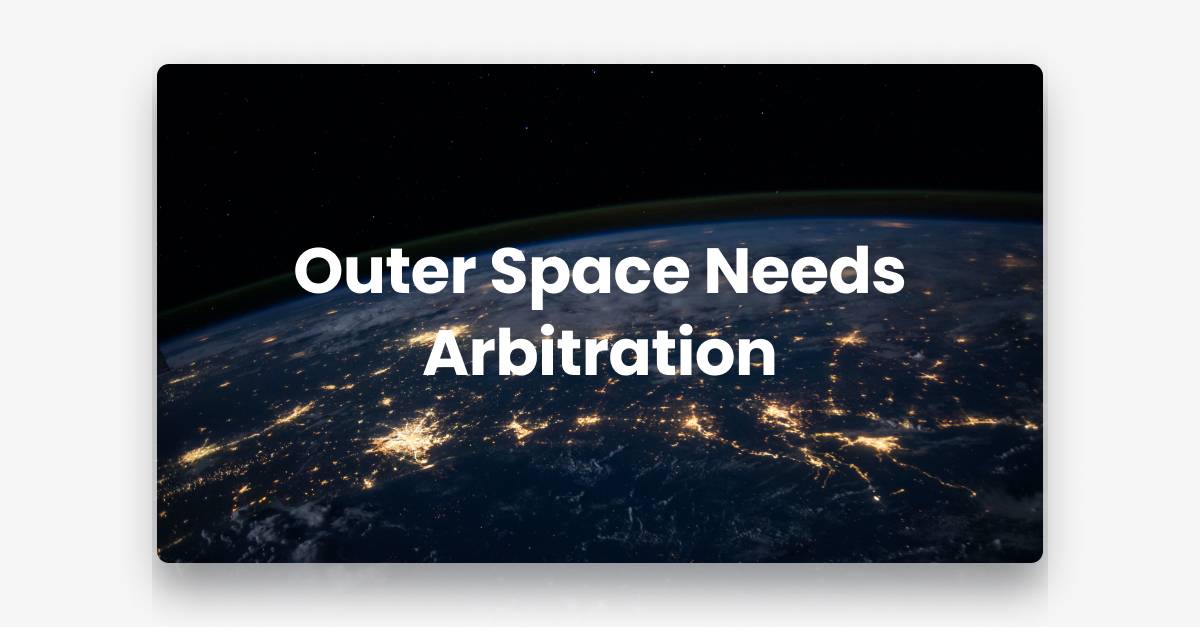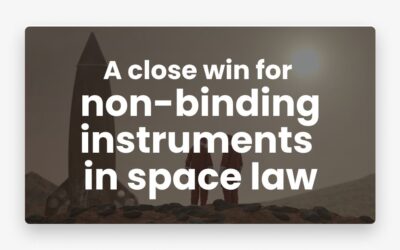Outer Space Needs Arbitration
By Luc Colin
On 13 January 2022, the Space Arbitration Association hosted its first event, a discussion surrounding the question of whether outer space needs arbitration. The panel was moderated by Laura Yvonne Zielinski, Founder of the Space Arbitration Association, and featured Prof. Frans von der Dunk (Nebraska College of Law), Prof. Steven Freeland (Western Sydney University and Bond University, Australia), Dr. Jan Frohloff (Independent Arbitration Practitioner), and Stefanie Haeseker (OHB SE). It was the first of a 2022 conference series of eight conferences organized by the recently founded the Space Arbitration Association, which has set as its mission to provide a forum for discussion between the space and the arbitration communities.
Wherever Humans go, the Lawyer Goes
Prof. Frans von der Dunk started his presentation by setting out the evolution of international space law, which has developed along with space activities. The launch of the first artificial Earth satellite Sputnik, in 1957, gave rise to discussions within the United Nations and, in 1691, to a General Assembly Resolution on Space laying down the first legal principles (United Nations General Assembly, Resolution 1721 (XVI), International co-operation in the peaceful uses of outer space, 20 December 1961).
In 1967, the Treaty on Principles Governing the Activities of States in the Exploration and Use of Outer Space, including the Moon and Other Celestial Bodies (the “Outer Space Treaty”) was opened for signatures, providing the first legal framework for space activities (United Nations, General Assembly, Resolution 2222 (XXI), Treaty on Principles Governing the Activities of States in the Exploration and Use of Outer Space, including the Moon and Other Celestial Bodies, 19 December 1966). Elaborated at a time when a handful of States were the only actors of the space industry, the Treaty revolves around a State liability regime. By holding States responsible for the actions of their private actors, the Outer Space Treaty encouraged the development of national space laws, with the aim for States to define the scope of private space activities and to regulate them (e.g. a licensing regime for space activities). As of today, at least 29 countries have adopted national space laws.
For a long time, diplomacy has been favored to resolve disputes arising from space activities. In 1972, the Convention on International Liability for Damage Caused by Space Objects (the “Liability Convention”) was concluded (United Nations, General Assembly, Resolution 2777 (XXVI), Convention on International Liability for Damage Caused by Space Objects, 29 November 1971). It holds States liable for damage caused by their space objects and contains a dispute resolution procedure consisting of diplomatic negotiations followed by the establishment of a Claims Commission, a quasi-arbitral tribunal. This mechanism is however only available to States and not to private parties, and the award rendered by the Claims Commission remains a mere recommendation unless all States involved in the dispute agree that it will be binding.
In 1978, following the scattering of radioactive debris over northern Canada by the defunct Soviet satellite Kosmos 954, Canada issued a claim against the Soviet Union, based among others on the Liability Convention. Although the dispute was finally resolved diplomatically, this remains the only time the Liability Convention has been invoked so far.
Prof. Frans von der Dunk then mentioned a major paradigm shift in space activities since the 1980s. First, space activities were no longer carried out by only two superpowers, but by many countries around the world. Even more importantly, space activities became more “practicalized”, developing into highly marketable applications (e.g. satellite navigation, phone communication, etc.), which led many private actors to become involved in this area.
Hence, adjusting the available dispute resolution options to make them accessible to non-state actors became and remains essential. The challenge will be to preserve a balance between ensuring that private actors respect international rules and guaranteeing that the legitimate interests of those private actors are not crushed by State interests.
In 2011, the Permanent Court of Arbitration (the “PCA”) published its Optional Rules for Arbitration of Disputes Relating to Outer Space Activities (the “PCA Outer Space Rules”), allowing private sector entities, along with States, to defend their interest in a dispute (Permanent Court of Arbitration, Optional Rules for Arbitration of Disputes Relating to Outer Space Activities, effective 6 December 2011). These Rules offer a flexible arbitration procedure, a specialized panel of arbitrators and scientific experts, and lead to a binding legal settlement enforceable internationally.
However, they have yet to be used. Indeed, States continue to rely heavily on diplomacy to solve their disputes. For States, the reasons are linked to the national security issues surrounding space activities. From the private sector perspective, the small number of actors on this market encourages each of them not to antagonize future partners by launching a dispute thus preferring collaboration over formal dispute resolution proceedings.
Of great interest for space arbitration practitioners, Prof. Frans von der Dunk, however, thinks this trend will be reversed as more and more private actors emerge. In his view, the PCA Outer Space Rules present the best method for private parties to assert their interests.
The Specificities of Space Disputes
Dr. Jan Frohloff first clarified the term ‘space dispute’. In his view, the term ‘space dispute’ might refer to a dispute concerning space law (e.g. a dispute regarding a satellite collision). But it might also refer to any dispute involving the space industry. There are contractual and investment disputes between players in the space industry, covering the whole cycle of manufacturing, launching, and operating spacecraft.
With regard to disputes concerning space law and actual activities in outer space, Dr. Jan Frohloff emphasized the need for the space industry to operate under more specific substantive rules for space activities. Once these rules are established, disputes concerning outer space activities will largely benefit from arbitration. One example for that is space traffic management: the industry would greatly benefit from a legal framework governing liabilities in case of satellite collisions. Due to the current lack of multilateral agreements, bilateral agreements are being favored by private actors. A recent example can be found in the agreement signed between SpaceX and NASA, whereby SpaceX agreed to move its satellites, should they come close to a NASA spacecraft (NASA, SpaceX, 15 January 2021, Non-reimbursable Space Act Agreement between the National Aeronautics and Space Administration and Space Exploration Technologies Corp for flight safety coordination with NASA assets).
On the subject of dispute resolution of space industry disputes, Dr. Jan Frohloff observed that arbitration is already playing an important role. In his view this is due to the numerous advantages of arbitration such as: (1) Arbitration provides a neutral forum. The space industry can be subject to political influence (e.g. some space objects might be dual-use goods constituting strategic military assets). Arbitration can be a way for the parties to neutralize such political influence; (2) Arbitration offers expertise. Since space law disputes can involve technical issues, the possibility offered by arbitration to the parties in dispute to choose arbitrators with a relevant background is thus a great advantage; and (3) Arbitration ensures confidentiality. Depending on the seat and the rules of the arbitration, confidentiality can extend to any document produced by the parties.
In this context, he mentioned that one should keep in mind that space contracts give rise to disputes with some unique features: (1) Typical space industry disputes are based on a contract but can involve legal issues beyond contract law, such as export control regulations. For example, in ABS v. KT and KTSAT, the arbitral tribunal had to decide whether title to a geostationary satellite had passed from the seller of the satellite (KT) to the buyer (ABS). (ABS Holdings, Ltd and ABS Global, Ltd v. KT Corporation and KTSAT Corporation, ICC Case No. 19958/AGF/RD/MK) In this case, two years after the transaction had closed, Korea’s Ministry of Science issued an order that declared the Purchase Agreement “null and void” and in violation of the mandatory law because KT had allegedly failed to obtain an export permit; and (2) Operating in space is hard and contracts in this industry generally focus on the allocation of liability between the different parties to the contract. These contracts, therefore, present a challenge in defining and interpreting the terms that transfer liability from one party to another (e.g., the “launch” of a vehicle), as well as insurance issues.
Finally, Dr. Jan Frohloff observed that while most of the disputes involving the space industry are contract-based, there is certainly room for investment arbitration, as long as an investment is made in a host state on planet Earth. An example is the Antrix v. Devas dispute, which gave rise to one commercial arbitration before an ICC tribunal, and two investment arbitrations under the India-Mauritius BIT and the India-Germany BIT (CC/Devas (Mauritius) Ltd., Devas Employees Mauritius Private Limited and Telecom Devas Mauritius Limited v. India, PCA Case No. 2013-09, and Deutsche Telekom v. India, PCA Case No. 2014-10).
Alternative Dispute Resolution Mechanisms for Space Transactions
Next, Prof. Steven Freeland stressed that space law has been developed both at the international and commercial levels. At both levels, actors have been focusing heavily on preventing the disputes before they arise through multiple instruments such as: (1) The promotion of peaceful settlement of disputes, as in the Liability Convention and the Agreement Governing the Activities of States on the Moon and Other Celestial Bodies (United Nations General Assembly, Resolution 36/48 (XVI), Agreement Governing the Activities of States on the Moon and Other Celestial Bodies, 5 December 1979); (2) The use of non-appropriation clauses to prevent any territorial claim; (3) The use of cross-waiver of liability in many commercial contracts, whereby parties waive their rights to sue each other under a contract.
In his view, however, this is likely to change. He stated several reasons that will lead to an increasing number of disputes, and to the need to develop dispute resolution mechanisms. First, the growth of space activities has led to an increasing amount of space debris that will cause accidents. Second, the multiplication of non-governmental actors, which do not have access to current dispute resolution mechanisms at the treaty level, will encourage the development of alternative dispute resolution mechanisms.
Prof. Steven Freeland explained that future space disputes will be more numerous and more diverse, and may involve States and commercial actors. Consequently, space law should not rely on a unique dispute resolution mechanism, but rather on a variety of them. Options include the International Court of Justice and arbitration institutions including the Permanent Court of Arbitration, the International Court of Arbitration of the International Chamber of Commerce, and specialized courts such as the Dubai Space Court.
Finally, Prof. Steven Freeland pointed out that although arbitration has a role to play, especially when the disputing parties are large companies, it can remain expensive and consuming in terms of time and internal resources. This is why other mechanisms, like expert determination, may better fit the needs of smaller companies.
Arbitration in Space: the Space Industry’s Perspective
Stefanie Haeseker, senior legal counsel at OHB SE, a space and technology group based in Germany developing and producing space systems and products for the aerospace industry, and operating satellite data, started her presentation with an introduction to OHB’s activities and clients.
She mentioned that OHB’s key customers include the European Space Agency, the German Aerospace Center, as well as the German Federal Ministry of Defense, and stressed that because of this client base and the fact that companies like OHB are conducting business in a very narrow market, where many customers are public actors, OHB operates in a highly political environment. In her view, it is for this reason that arbitration has not played an important role yet.
Acknowledging that there is a critical need for confidentiality in the space industry, she considered that this is already being addressed in current space contracts through the introduction of original dispute resolution mechanisms. As an example, Stefanie Haeseker referred to the publicly available general clauses and conditions for ESA contracts which require parties to refer disputes to a “dispute resolution board”, composed of two senior representatives from each party and ESA’s industrial ombudsman. It is only if the dispute resolution fails at this level and no other arbitration is foreseen in the contract with ESA, that a dispute shall be settled in accordance with the arbitration rules of the ICC.
In conclusion, she stated that arbitration is already contemplated in contracts but has not played a role yet. This might change, according to Stefanie Haeseker, since the increase of actors and activities in this industry will result in more disputes. In addition to the need for comprehensive national and international space rules, the space industry would also benefit from international arbitration.
The Challenge of Space Debris
In response to questions asked by the audience, the discussion then turned to the challenge of space debris. The panelists recalled that the Liability Convention covers the liabilities that may be incurred in case of collisions of space debris with active satellites. In such a scenario, the Liability Convention provides that a launching State shall be liable for damages caused by its space object to a third State’s space object, based on the “fault” of the launching State. In this regard, Prof. Steven Freeland highlighted that we still do not clearly know what is meant by “fault”. While the Space Debris Mitigation Guidelines could give some directions in this regard, further guidance is needed as the Liability Convention is likely to play an increasingly important role in the future.
Moreover, since the Liability Convention only applies between States, it does not provide any remedy for private victims (e.g., private satellite operators) who will have to resort to national tort laws. Finally, Prof. Frans von der Dunk pointed out that the traditional challenge of identifying the guilty party may become especially hard in the case of debris (e.g. when the debris that caused the collision comes from a previous collision, years before).
You might also like
Investment Protection and Space Investors
Investment Protection and Space Investors By Luca Erhart and Riccardo LoschiInvestment Protection...
A close win for non-binding instruments in space law
A close win for non-binding instruments in space law By Ruvimbo Samanga"A close win for...
Space Arbitration: Protecting Space Investments
Space Arbitration: Protecting Space Investments By Katie MakSpace Arbitration: Protecting Space...


